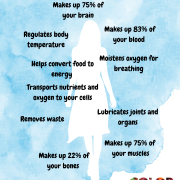Hydrate for Health’s Sake!
Did you know water is the most common nutritional deficiency in the U.S? About 60% of our body is water. We can go 8 weeks without food but only days without water.
[su_expanding_quote_web alignment=”full” source_site=”U.S. National Library of Medicine” source_url=”https://www.ncbi.nlm.nih.gov/pmc/articles/PMC2908954/” full_quote=”Mild to moderate (body water loss of 1 – 2 %) levels of dehydration can impair performance on tasks such as short-term memory, perceptual discrimination, arithmetic ability, visuomotor tracking and psychomotor skills. Reintroduction of fluids can reverse dehydration-induced cognitive deficits.” short_quote=”Mild to moderate dehydration can impair performance on tasks such as short-term memory, perceptual discrimination”]Quick look at some functions water performs for physical and cognitive health:
- Improves oxygen delivery to the cells
- Transports nutrients
- Enables cellular hydration
- Moistens oxygen for easier breathing, it’s easier on our windpipes and lungs
- Cushions and lubricates bones and joints; there’s an important relationship between hydration and cartilage because they are not vasculated so they dehydrate slowly and rehydrate slowly. It can take months to completely rehydrate joints and bones
- Absorbs shock to joints and organs
- Regulates body temperature
- Prevents tissues from sticking, dehydrate makes you stiffer and you have less flexibility –
- Improves cell communications – we are electrical beings, part of our communication system depends on electrical potential of our body which requires hydration
- Helps body’s natural healing power
- Provides hydration for digestion, without water we cannot properly digest
- Removes waste thru urination, through cellular level to kidneys
If body water content drops by as little as 2%, it causes fatigue. Chronic dehydration can cause:
- Joint pain — drink water and electrolytes for a long time to rehydrate
- Back pain – the discs in our back are composed of cartilage
- Migraines – because of the relationship between fluid in the blood and dilation/constriction of blood vessels in brain
- Colitis – the colon is poorly vasculated (meaning it does not get blood flow). It gets hydration and energy supply through a process of reabsorbing water material in the colon and recycling nutrients from the fecal material. Chronic dehydration of the colon leads to inflammation, chronic inflammation leads to disease
If the body’s water content drops by 10% it will cause significant health problems:
- Digestive
- Cardiovascular
- Immune
- Musculoskeletal
Water intake is impacted by the foods we eat. Ancestral foods (what humans ate for millennia) were water-rich: tubers, grasses, fruits, vegetables, etc. Modern foods are very dry. And instead of drinking water, most beverages consumed are:
- Juices – which are dehydrating
- Tea – which is dehydrating. Green tea is not as dehydrating as black tea
- Coffee – also dehydrating; consumption is about half a gallon per person per week
- Alcohol – this moves water into the cells and out of the blood to detoxify
- Carbonated soft drinks are the worst offenders –59.9 gallons/person/year!
- People who don’t drink sodas, are probably drinking carbonated fake sugar water, 2 – 3 gallons/week .
- Original Gatorade consisted of electrolytes, but today’s Gatorade lacks adequate electrolytes, is sweetened with high fructose corn syrup, and has artificial dyes. Most sports drinks are junk.
What to Do?
- Drink water. In general, we need a minimum 2 oz per pound/day
- Drink a glass or two of water after waking up. Our bodies detox while we sleep, drinking water helps flush those toxins out
- Sip throughout the day
- Get a high-quality water filter and drink filtered tap water. Unfiltered tap water often contains fluorine, chlorine, and even lead. It’s best to You’ll save money, drink water that’s purer than tap water and help solve the global glut of plastic bottles
- If buying spring water, look for spring water bottled at the source, ideally in glass bottles
- Find a natural spring near you (visit FindaSpring.com)
- Avoid drinking out of plastic bottles. They leach BPA, a toxin that is hard on endocrine systems, especially female hormones
- Never drink from a plastic water bottle that got hot in a car







Leave a Reply
Want to join the discussion?Feel free to contribute!